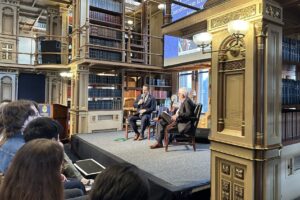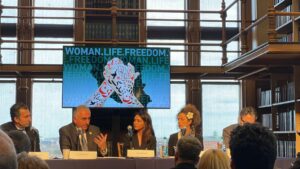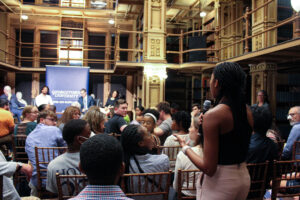Three champions of racial justice spoke on advancing racial equity on Oct. 26 in Riggs Library, the first in a series of panel discussions hosted by the Georgetown Racial Justice Institute. Speakers explored how the fight against racism has evolved over decades, as well as how to address inequities and invest in minority groups.
The panel discussion was moderated by Dr. Sheila Foster, Georgetown professor of Law and Public Policy. The event featured Elise Bottie, professor of law at the University of Michigan; Ryan Hayward, civil rights lawyer and CEO of the New Jersey Institute of Social Justice; and Michael Harriet, political commentator and author of “Black AF History.”
The panelists began by speaking about the U.S.’s history of racial discrimination. Panelists used “the storm” to reference racial issues that have plagued Black and brown communities throughout U.S. history, citing school segregation, the Reagan and Trump administration, and more recently, voter suppression tactics.
“Every generation that has existed since we have arrived on these shores confronted its own storm,” Hayward said. He described each storm as one in which “efforts to expand democracy have existed alongside efforts to scale it back.”
Panelists said American democracy has been weakened through discrimination, citing waves of voter suppression laws passed by state and federal legislatures. Currently, at least 14 states have implemented legislation making it more difficult to vote through laws like those in Texas, consolidating polling locations and increasing wait times, providing obstacles for people, especially from marginalized communities, to cast their vote.
Bottie highlighted the intersection between the weakening of American democracy, causing a rise in white supremacy, and racism towards Black and brown people.
“We’re in this crisis and we’ve been in this crisis before,” Bottie said. “It feels different in many respects because of the rise in authoritarianism.”
Harriet emphasized that white supremacy is the biggest threat to advancing racial equity. To address this “storm,” Harriet said it’s necessary to dismantle a government system that is fundamentally racist.
Referencing the Jan. 6 insurrection and racism under the Trump administration he stated that “the law does not exist if white supremacy exists.” Harriet said that the U.S. has oppressed Black and brown communities since its founding.
“Kernels of white supremacy have always been there. It’s like a vine strangling democracy and strangling Black and brown folks in particular,” Bottie added.
The speakers then turned to solutions.
“How do Black people win? And not just reduce harm and brutality?” Hayward questioned.
They emphasized a “ground-up” approach — engaging with communities and creatively working on racial justice with those most touched by oppressive systems through grassroots initiatives.
Ground-up approaches have become increasingly more prevalent across the Georgetown community as well. The Racial Justice Institute was launched in 2021, aiming to address racial inequities across university disciplines. Engaging with the student body, faculty, staff, and other community members with discussion events and interdisciplinary research, the institute seeks to bring creative solutions and discussions like this panel to campus.
Reparations supporting Black and brown communities were agreed upon by the speakers as another major solution to address racial injustice. Georgetown has begun paying reparations through its donation of $27 million to the Descendants Truth and Reconciliation Foundation. The donation was made in partnership with GU272 Descendants Association, an organization representing thousands of descendants of slaves who were sold by Maryland Jesuit priests to raise money for the construction of the university.
“Resistance to [reparations] is a reflection of how all too often, our imagination is too limited,” Hayward said. “We’re talking about huge harm to Black people and the remedy is so modest.”
At the end of the evening, the panelists were encouraged to provide insight on advancing equity on an individual part through advocacy. Bottie told students to think about resistance on all levels — big and small.
“Find pockets where you can make a difference.”







